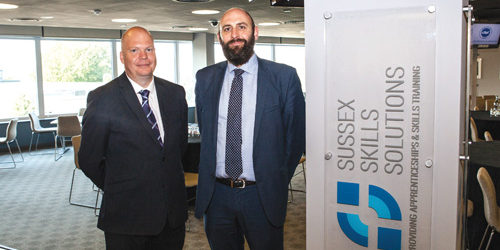
After becoming one of the first firms in the country to specialise in employment law, Sherrards expanded into HR, Occupational Health and Recruitment. The founder and owner is also a mean rally driver. Ian Trevett met with Harry Sherrard to talk about employment law - and avoiding tribunals.
Employment law is a relative newcomer to the legal scene, and Harry Sherrard was one of the first lawyers to concentrate on this area. “I established the practice in the summer of 1999, specialising in employment law, and we’ve grown and developed since. These days, most law firms claim to have an employment partner but when I started it wasn’t like that. I was one of the first pure employment lawyers.
“Employment law just grabbed me. It was a subject I enjoyed and seemed to get on well with. I always had the vision and the ambition to have my own firm and certain ideas as to how to go about doing that.”
It is worth defining what employment law is. It is the body of law that governs the employer-employee relationship, including individual employment contracts, and statutory regulation on issues such as the right to organise and negotiate collective bargaining agreements, protection from discrimination, wages and hours, and health and safety.
Effectively it is all about the stuff that goes on in a workplace. Employment lawyers step in when it all goes wrong, and are often appointed to represent parties at an employment tribunal. While this is one of Harry’s area of expertise, it is also a situation he tries to avoid.
“We get pulled in after a situation has broken down, but rather than immediately advising on the law, we’ll say: “Let’s de-legalise this. What you really need here is mediation. Let’s just get these two guys together.” We’ll get a mediator in to sit with each of them individually to work through their problems, then get them together, and try to see if we can resolve it that way. We avoid a legal situation if it’s not necessary. This is in keeping with our overall ethos of offering completely rounded employment advice and not just the legal bit.”
It was this ethos that resulted in an expansion into other areas of problem prevention. Sherrards quickly expanded into HR, occupational health, and health and safety. Harry saw it as the firm’s duty to help employers avoid the cost and confrontation of legal battles.
“I had a vision of being a multi-disciplinary employment practice, always with employment law at the core of it. We’ve been fortunate over the years to build up a first class and very loyal client base, many of which are the UK arms of international businesses, though with many smaller employers as well.
“Our HR department helps with projects such as recruitment strategies and training, and then we can go on to look at contracts, handbooks, and looking after employees’ welfare through the occupational health side. If it doesn’t work out we can help with separation arrangements and then if it goes really pear-shaped, then we defend employers in employment tribunals. We fight cases all over the country for our clients.
Many employers will regard us a distress purchase, as trouble shooters, but it should be the other way round. Get us involved at the front end, make things better and then you’ll have less need of us further along the line.”
It must be frustrating to see employers and employees make the same age-old mistakes over and over again. Harry must have seen it all.
“We certainly have. One of the most common scenarios is where an employee is not performing his or her job well. The managers initiate performance management processes, and then the employee claims:
“You’re bullying me”. Two sides of the same coin: performance management or bullying? That’s a very common situation and we’ve got various techniques to assist employers to manage their way through that process. They can end up in a stalemate, so we help them break out of that.
“If it does end in a termination of employment, not many people realise that the employee has to mitigate the loss and find alternative employment. If a case is a bit difficult to win, we might concentrate more on assessing that person’s job prospects and say “There are quite a lot of jobs so you should get a job within three months. So even if you go and win this case, you’re only going to get three months’ loss of earnings. If the employer pays that to you up front, that would be a sensible settlement.”
“So with various inputs, cases can be settled on terms that work for both sides. Often I’ve seen employers put up with problematic staff for years, and are pleasantly surprised when we can work out separation deals for far less than they expected.
“Other issues may be drug-testing of staff, especially if it’s safety-critical, such as driving or engineering. And, of course, diversity is a big consideration, especially with local authorities.”
In the 17 years of trading, Harry must have seen many changes in employment law. What are the most striking changes?
“It is the way that is has expanded. Back in the early days when I started you had unfair dismissal and a few branches of discrimination. Now you’ve got a book of nearly 500 pages just on disability discrimination. When I started almost the whole employment law was in that book. Now you have a 500-page book on each sub-set of employment law.
“Going forward there’s Brexit. It’s an urban myth though that the majority of our employment law comes from Europe – that’s just not true. Unfair dismissal, redundancy, shared parental leave, national minimum wage - a lot of it is down to us.
“On the other hand, the transfer of employment regulations, known as TUPE, is purely European legislation. If you’re buying a business in America for instance you can say to the vendor: “I want your business but you need to make all your staff redundant and I’m just taking over the business without any staff.” That’s against the law over here, the staff come with the sale.
“It’s early days, but I think the mood music coming from Theresa May is that she’s not interested in trimming back employee rights – on the contrary, she’s giving indications that in certain areas she might actually extend rights. She has launched a consultation about the gig economy, the uber-drivers and so forth. So the Government is looking at potentially extending rights there.”
As well as the HR and consultancy side, Sherrards now has a recruitment arm. “It came about as we provided recruitment services informally to established clients, and so we developed that.
“It’s unusual. I don’t think there’s another legal firm that has a recruitment business as well. We don’t have hundreds of vacancies – it’s very much bespoke, individual assignments. We occupy the space between head-hunting and high street recruitment.”
“It enables us to provide our clients with a holistic service, through the full cycle of employment, from recruitment to training to policies to HR advice to welfare and through to exit, if necessary.”
Ultimately, Harry is happy to prevent the need for legal fights. He is passionate about mediation and prevention of acrimonious dismissals or resignations. It is unusual for a company to feel a sense of success if they stop themselves getting the juicy work, but Sherrards is an unusual business. And long may it continue in such a vein.
www.sherrardslaw.com






